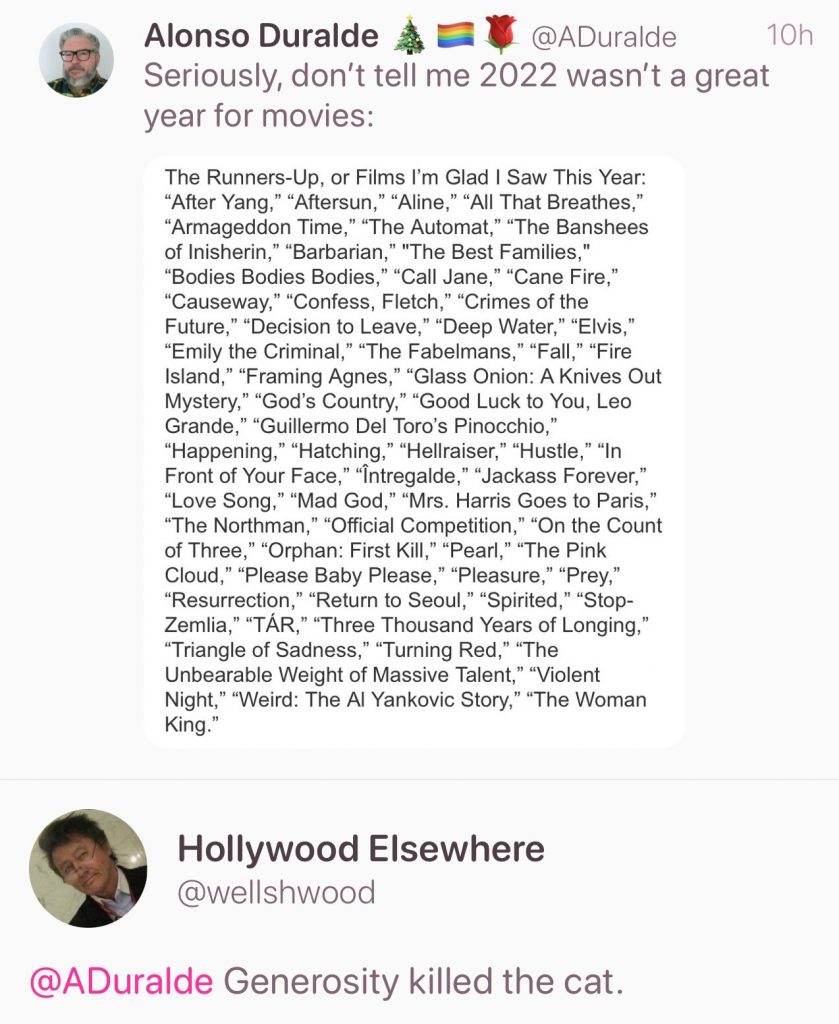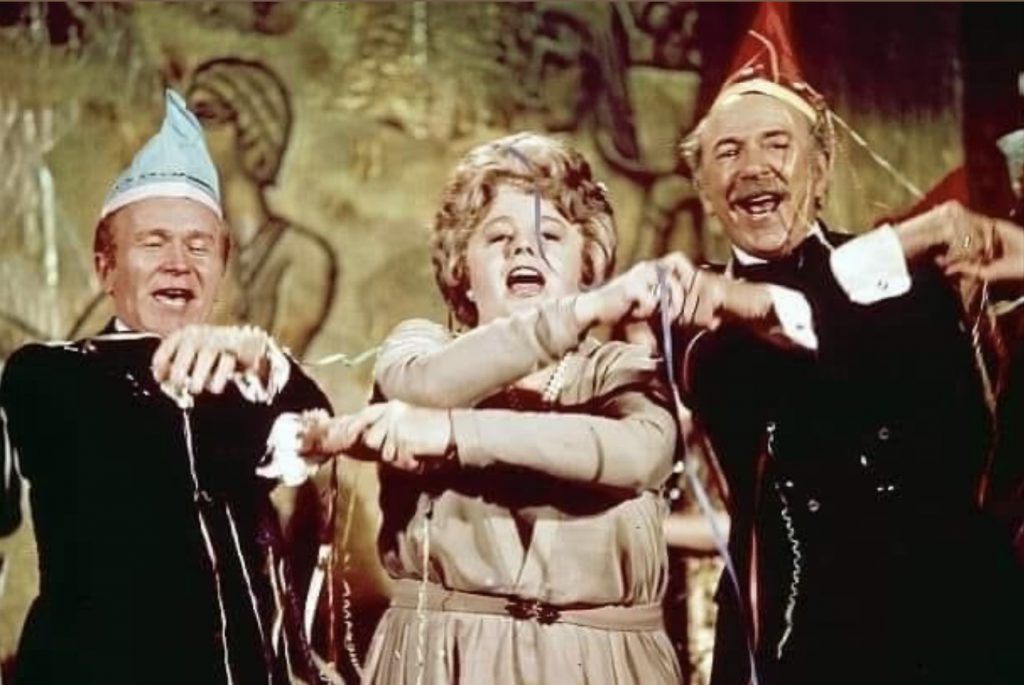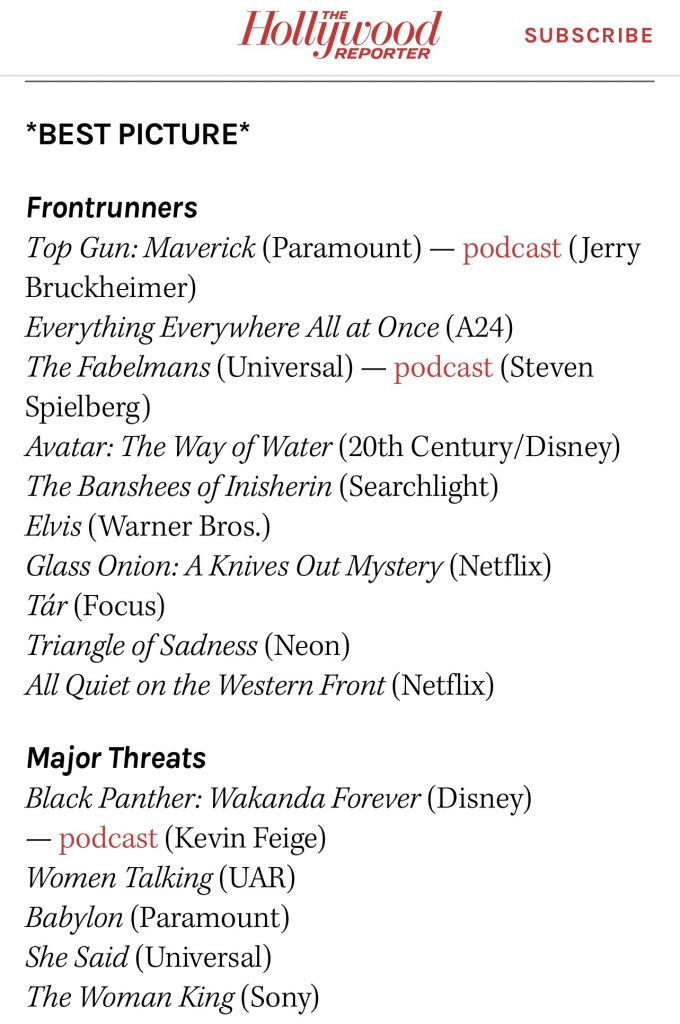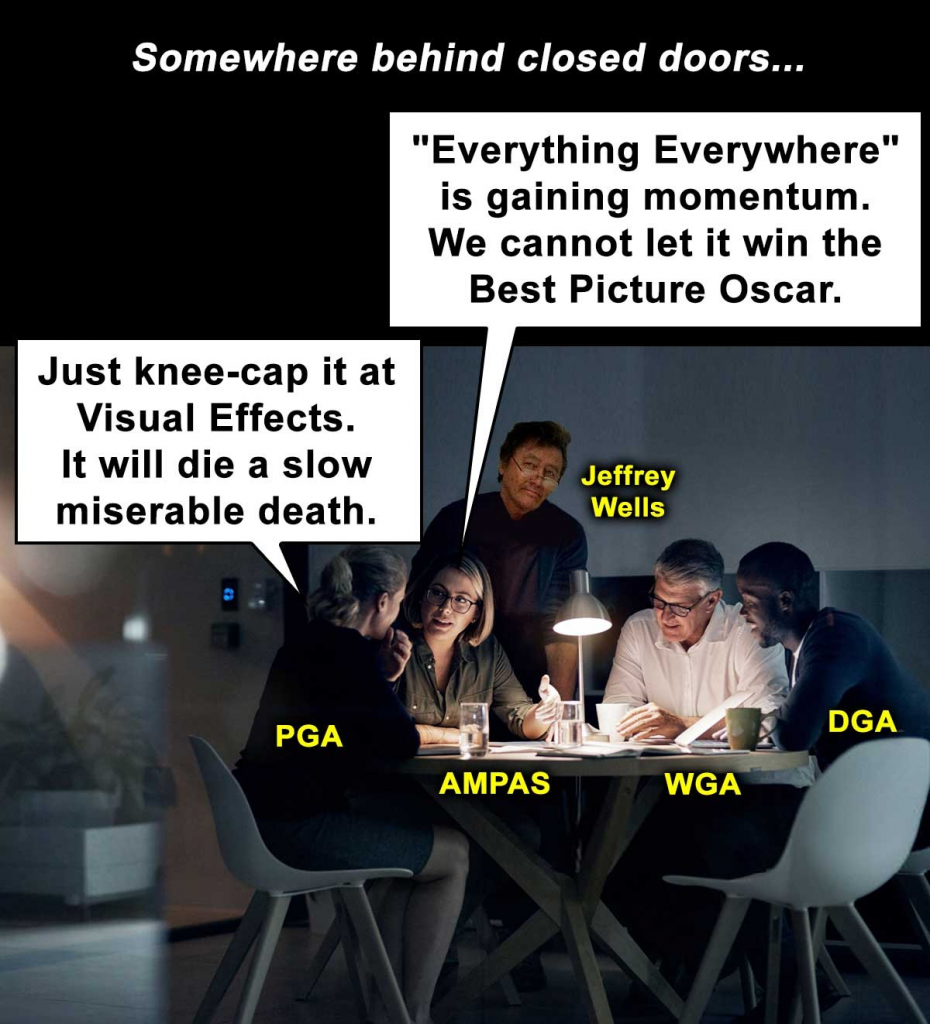

Against my better judgment I offered to take Jody to an IMAX 3D showing of Avatar: The Way of Water. This evening, I mean. Not at HE’s preferred venue (Loews Lincoln Square, which has a full-sized IMAX screen) but at a cheeseball Cinemark gladiator plex in Milford (fake IMAX, crawling with families).
I suspected that Cinemark would subject viewers to the same 20 to 25 minutes of trailers that AMC does, but I wasn’t sure. So I asked an overweight Millennial ticket-taker (bad complexion, awful tennis-ball haircut) how long the “interminable trailer crap” would run for, and the little wuss became upset at the c-word and walked away. He went over to the manager (male, 40ish, balding) and asked him to deal with me because he felt unsafe speaking to a customer who hates watching trailers and uses mildly vulgar terminology.
I didn’t like the OMTT because I hate overly sensitive Millennials as a rule. All he had to do was spit out the trailer running time — i.e., 25 minutes. Alas, behaving like a man was beyond his ability. We exchanged dirty looks.
After I’d been informed by the manager that the trailer bombardment would indeed run 25 minutes, I walked toward the popcorn counter. Mr. Sensitive Weight Problem came over, pointing and shouting “don’t you ever talk that way to me again! I’ll have you thrown out!”
What? I didn’t vocally reply but I went into a brief theatrical simulation of being scared. “Okay, that’s it…throw him out!”, the fat ticket-taker barked at a security guard.
The guard was older, calmer. “You got a ticket?” I showed him my dinky toilet-paper pass for IMAX theatre #8. “Okay,” he said. “The theatre’s right over there.” But I don’t want to be in the theatre right now, I replied, as I hate watching bombastic trailers. “Okay, but just step away to the side until the fat ticket-taker calms down,” he said.
All right, the guard didn’t actually say “until the fat ticket-taker calms down” but that’s what he meant. I nodded and strolled away.
The bottom line is that Millennials don’t always act like professionals. Their sensitive feelings are what matter the most. Which is why I’m not a fan.
She likes strong, dominant men and you’re too smooth and mushy to qualify. She’s sexier and better looking than you — it would be one thing if you were gym-toned with big broad shoulders to match her large breasts, but you’re not. Plus she’s much more powerful than you (economically, fame-wise) and she’ll soon be punishing you for these shortcomings — trust me. Plus she’ll eventually humiliate you when a more suitable lover comes along. And you’ll never really recover from this. You’ve fucked yourself. If only you’d stayed with Debbie Reynolds…

It’s completely silly to dismiss years ending in 3 as, historically speaking or artistic accomplishment-wise, somehow underwhelming or vaguely forgettable.
But I’ll say it anyway. I’ve always felt a certain dismay about or distance from such annums.
3 is an odd number — I’ve always preferred the evens. I didn’t like being 3 or 13 —the first tolerable year in this stream was when I turned 23, and even that was mildly sucky.
What happened in 1903, 1913 and 1923? Not that much. The only good things about 1933 were the inauguration of FDR and the opening of King Kong. ‘43 was a WWII in-between year. Several films that opened in ‘53 were pretty good (War of the Worlds, Stalag 17, Julius Caesar, Roman Holiday, The Big Heat) but history-wise it was fairly drab. JFK was murdered in ‘63. 1973 was a great Watergate year, but movie-wise it couldn’t hold a candle to ‘71. One of the few good things about ‘83, movie-wise, was the release of Betrayal. ‘93 was a passable movie year (The Firm, Schindler’s List, True Romance, Philadelphia) but let’s not get too cranked up. ‘03 was the farcical invasion of Iraq. I loved many 2013 movies (The Wolf of Wall Street in particular) and my life was going pretty well so ‘13 gets a pass, but I’m not feeling all that great about ‘23.

Born in 1929, legendary TV journalist and probing celebrity interviewer Barbara Walters (aka “Baba Wawa”) has passed at age 93. She bagged so many big-deal, on-camera interviews during her half-century-plus career (many U.S. Presidents, Fidel Castro, Barack Obama, Katharine Hepburn, Monica Lewinsky, Warren Beatty, Vaclav Havel, Boris Yeltsin) that there’s no room to list them all. Not to mention the satirical stamp of Gilda Radner. Not to mention Walters launching of The View in ‘97. Respect for a major influencer & feminist pathfinder.


THR’s Scott Feinberg has abandoned Everything Everywhere All At Once as his #1 pick for the Best Picture Oscar winner, and has shifted Top Gun: Maverick into the top slot. Variety’s Clayton Davis also got behind Maverick a few days ago with EEAAO relegated to fourth place.
Thank fortune that Feinberg and Davis have faced reality and “seen the light”, so to speak.
Ke Huy Quan (i.e., “Short Round”) might win the Best Supporting Actor Oscar but EEAAO is all but finished as far as betting on the Big Prize is concerned.
And this is how it should be. Standards of cinematic decency are prevailing. Let everyone understand that HE is the epicenter of the worldwide EEAAO takedown campaign…a cause near and dear to the hearts of all serious cinema lovers.


There’s something hugely joyful about reuniting with my mail-order John Wayne Red River brass belt buckle. The fact that I’m happy to once again have it in my possession means, of course, that I’m just as much of a racist swine as Wayne was during his lifespan, and has nothing to do with my loving the 1948 Howard Hawks western (which, as the buckle points out, was actually shot in ‘46).

If there’s one thing that today’s director-writers don’t seem to want to do and generally avoid doing for the most part, it’s letting the audience put two and two together. (The seventh screenwriting rule according to Billy Wilder or more precisely Ernst Lubitsch). Most filmmakers don’t like the idea of Joe and Jane figuring stuff out — they’d rather just spell it out in so many words.
